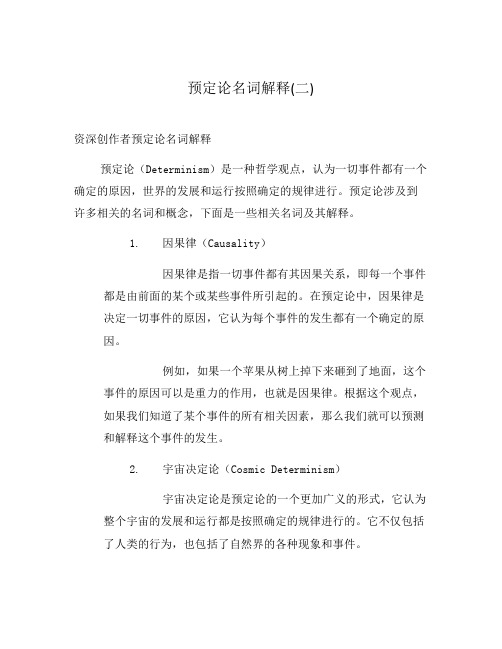迷信(superstition
迷信英语作文

迷信英语作文Superstitions and Their Influence on English。
Superstitions are beliefs or practices that are not based on scientific reasoning or evidence, but rather on traditional or cultural beliefs. They have been a part of human culture for centuries and are still prevalent in many parts of the world. English language and culture are no exception to this, as there are many superstitions thathave influenced the language and its usage.One of the most common superstitions in English is the belief in lucky or unlucky numbers. For example, the number 13 is considered unlucky in many English-speaking countries, while the number 7 is considered lucky. This belief inlucky or unlucky numbers has influenced the language in many ways, such as the use of phrases like "lucky seven" or "unlucky thirteen". It has also led to the omission of the 13th floor in many buildings, with the number being skipped from the elevator buttons and floor numbering.Another superstition that has influenced English is the belief in the power of certain words or phrases. For example, the phrase "break a leg" is often used to wish someone good luck before a performance, as saying "good luck" is believed to bring bad luck. Similarly, the word "jinx" is used to describe a situation where someone has brought bad luck upon themselves or others. These beliefs have led to the creation of many idioms and expressions in English, such as "jinxed", "knock on wood", and "touch wood".Superstitions have also influenced the use of certain animals in English idioms and expressions. For example, the black cat is often associated with bad luck, and the phrase "a cat has nine lives" is used to describe someone who has survived a dangerous situation. Similarly, the owl is often associated with wisdom and knowledge, and the phrase "wise as an owl" is used to describe someone who is knowledgeable or intelligent.In addition to these examples, there are many othersuperstitions that have influenced English language and culture. For example, the belief in ghosts and spirits has led to the creation of many ghost stories and horror movies in English-speaking countries. The belief in the power of amulets and talismans has led to the use of lucky charms and symbols in English culture, such as the horseshoe,four-leaf clover, and rabbit's foot.While some may argue that superstitions are harmless and add a bit of fun and mystery to life, others believe that they can be harmful and lead to irrational thinking and behavior. It is important to approach superstitions with a critical and rational mindset, and to not let them dictate our actions or beliefs.In conclusion, superstitions have had a significant influence on English language and culture, from the use of lucky or unlucky numbers to the creation of idioms and expressions. While some may find them entertaining or intriguing, it is important to approach them with arational mindset and not let them dictate our actions or beliefs.。
迷信一词的起源

“迷信”一词的起源“迷信”这个概念最早是由新柏拉图主义者提出并用以指称不正确的信仰,随着奥古斯丁对基督教神学体系的建立以及与异族的接触,“迷信”专门用以称呼非基督教信仰,言外之意惟有基督教才是世界上“最正宗”的宗教,异族的信仰皆是一种神灵崇拜、巫术、“迷信”。
宗教改革之后,新教继承了天主教对正统信仰与迷信的划分。
而此时也正是科学传播的早期阶段,对理性的追求将宗教与科学对立了起来。
由培根开启的近代科学继承了文艺复兴时期怀疑权威的传统,不仅审视迷信,还质疑经院哲学和宗教,20世纪20年代,科学占据了权威的地位,它让人相信自然法则是支配宇宙的惟一力量,宗教也被归入“迷信”之列。
总之,“迷信”(superstition)一开始是指与基督教相异的宗教信仰,后来随着西方科学的发展,它也指包括基督教在内的宗教信仰。
近代中国“迷信”概念的演变经历了相似的过程,但也有不同之处。
一、唐代至19世纪末出现的“迷信”一词无批判意义,不指向民间信仰,“迷信”一词使用的频率很低。
最早使用“迷信”一词的,是在一篇唐代墓志中:“既下车,闻有僧道峦属火於顶,‘加钳於颈’,以苦行惑民,人心大迷信。
”1沈洁认为此处“迷信”的意思泛指一种非理性的心理状态,并非专门指向民间的信仰形态。
219世纪末以前在对民间信仰的论述中常用的词汇主要有:淫祀、愚迷、愚昧、迷惑、迷妄等。
较早出现使用“迷信”一词的是在麦仲华主编的《皇朝经世文新编》和陈忠倚主编的《皇朝经世文三编》,这两本经世文编都成书于光绪二十四年(1898年)。
《皇朝经世文新编》卷16“外史”类中,收入了日本佚名作者的文章《论欧洲现情》,其中使用了“迷信”一词:“何则英驻土耳其大使言曰,亚儿米尼亚富人本不喜狂妄唱独立之说,诚恐刚暴无谋,奋激土人迷信宗教之心,遂以紊世局之静谧也。
”3沈洁认为这应当是“日本人用中文写作的时政文章,在戊戌维新思潮中传入中国。
”4《皇朝经世文三编》卷74中“外洋商务”类有《外洋商务巵言》一文,此文从内容到词句与上文所引《论欧洲现情》几乎完全一样,沈洁认为两部书中把“迷信”与“宗教”连用,是指同理性主义相对应的信仰世界或者更泛义地指向一种非常的心理状态,基本上是一个中性词,用来指代一种世界观,并不是直接指向对大众信仰形式的批判。
在中国的迷信英语作文

Superstition in China: A CulturalPhenomenonSuperstition, a common occurrence in various cultures, plays a significant role in Chinese society. Rooted in ancient traditions and beliefs, these superstitions have survived the test of time, influencing the daily lives of the Chinese people. This essay delves into the phenomenon of superstition in China, exploring its origins, manifestations, and the reasons for its persistence.The roots of Chinese superstition can be traced back to ancient times, when people relied on these beliefs to explain natural phenomena and seek guidance in their lives. For instance, the Chinese zodiac, which assigns a specific animal to each year of the lunar cycle, is deeply ingrained in Chinese culture. People often believe that their zodiac animal influences their personality and fate. Similarly, feng shui, the ancient practice of arranging objects in harmony with natural forces to promote positive energy, is widely followed in China.Manifestations of superstition are numerous and diverse in China. From traditional practices like burning incenseand paper money for ancestors to seeking auspicious dates and times for important events, superstition is pervasive. For instance, many Chinese believe that certain numbers, such as 8, are auspicious because they sound similar to words that convey positive meanings in Chinese. Conversely, numbers like 4 are considered inauspicious because they sound similar to words that have negative connotations.The persistence of superstition in China can be attributed to several factors. Firstly, the influence of Confucianism, a major philosophical tradition in China, emphasizes the importance of respecting ancestors and ancestors' wishes. This cultural value encourages the continuation of traditional practices, including superstitious ones. Secondly, the rapid pace of modernization in China has led to uncertainty and anxiety among some individuals. In such contexts, superstition offers a sense of comfort and reassurance, explaining unexplainable phenomena and providing guidance in uncertain times.However, it is important to note that whilesuperstition remains a significant part of Chinese culture,there is also a growing trend of skepticism and rational thinking. Many Chinese, especially the younger generation, are becoming more skeptical of traditional beliefs and are seeking scientific explanations for phenomena. This shift towards rational thinking and skepticism is a positive sign for the future of Chinese society, as it encouragescritical thinking and the pursuit of knowledge.In conclusion, superstition is a deeply rooted cultural phenomenon in China, manifesting itself in various practices and beliefs. While its persistence can be attributed to cultural values and social uncertainties, there is also a growing trend of skepticism and rational thinking. This平衡 of tradition and modernity reflects the dynamic nature of Chinese culture and society.**中国的迷信:一种文化现象**迷信,这一在各种文化中普遍存在的现象,在中国社会中扮演着重要角色。
“迷信”一词的渊源辨析

“迷信”一词的渊源辨析作者:何昭旭来源:《群文天地》2012年第22期清末以来,“迷信”就是一个比较热门的话题,一直到今天,讨论“迷信”问题的文章也并不鲜见,其角度也是多种多样,有的从历史的角度,有的从文化的角度,有的从心理的角度等等。
可是对于“迷信”一词的渊源流变,人们则注意甚少,凡是涉及这一问题的,大多是采取笼而统之的说法,一般而言有这么三种说法,其一、“迷信”一词为我国古典汉语所固有。
其二、该词源自佛教。
其三、来自于日本对西方概念的转译。
第一种观点认为,“‘迷信’这个词,原来常被宋明理学家用来批评庶民执迷不悟的信仰行为形式,与‘淫祠’、‘ 淫戏’等概念在意义上相一致,指与理学提倡的正统伦理观念和行为方式相对立、有碍正统伦理秩序推行的社会和思想活动。
”但是当笔者按图索骥去找寻宋明理学家们使用“迷信”一词的具体实例的时候,却发现一无所获,中国人民大学清史研究所的沈洁博士(现就职于上海社会科学院)在《“ 反迷信” 话语及其现代起源》一文里讲“迷信”一词唯一的一次出现在我国的古典文献里是在唐朝的一篇墓志铭当中:“既下车,闻有僧道峦属火於顶,加钳於颈,以苦行惑民,人心大迷信,脱衣辍食,竭产施与。
”沈洁博士的观点大概是正确的,因为笔者曾用尽办法去搜寻查找,亦未见其他古典文献中有类似情况出现。
另一方面,我们也会注意到在这篇墓志铭当中所使用的“迷信”一词的词性与含义与今天所使用的“迷信”决然不同,此二者显然没有有继承关系。
因此认为“迷信”一词自古有之的观点不妥。
至于第二种观点所认为的“迷信”一词来源于佛教,在书籍、网络中有不少人持有这种看法。
例如朱越利在《当代中国宗教禁忌》中说“迷信一词是来自于佛教经典的,是佛教称那种不能正确理解‘诸行无常、诸法无我’义理的人,对充满贪心、怨恨心和痴迷心的人为迷信。
”又如蒋劲松、杨新宇在《佛教与科学面面观》里说“由于佛教强调觉悟自心,反对迷信,主张因果自作自受,反对个人崇拜,就连‘迷信’一词本身就是佛教首先提出的,所以从古以来就是反对各种邪教迷信的重要力量。
“迷信”一词的渊源辨析

清末以来,“迷信”就是一个比较热门的话题,一直到今天,讨论“迷信”问题的文章也并不鲜见,其角度也是多种多样,有的从历史的角度,有的从文化的角度,有的从心理的角度等等。
可是对于“迷信”一词的渊源流变,人们则注意甚少,凡是涉及这一问题的,大多是采取笼而统之的说法,一般而言有这么三种说法,其一、“迷信”一词为我国古典汉语所固有。
其二、该词源自佛教。
其三、来自于日本对西方概念的转译。
第一种观点认为,“‘迷信’这个词,原来常被宋明理学家用来批评庶民执迷不悟的信仰行为形式,与‘淫祠’、‘淫戏’等概念在意义上相一致,指与理学提倡的正统伦理观念和行为方式相对立、有碍正统伦理秩序推行的社会和思想活动。
”但是当笔者按图索骥去找寻宋明理学家们使用“迷信”一词的具体实例的时候,却发现一无所获,中国人民大学清史研究所的沈洁博士(现就职于上海社会科学院)在《“反迷信”话语及其现代起源》一文里讲“迷信”一词唯一的一次出现在我国的古典文献里是在唐朝的一篇墓志铭当中:“既下车,闻有僧道峦属火於顶,加钳於颈,以苦行惑民,人心大迷信,脱衣辍食,竭产施与。
”沈洁博士的观点大概是正确的,因为笔者曾用尽办法去搜寻查找,亦未见其他古典文献中有类似情况出现。
另一方面,我们也会注意到在这篇墓志铭当中所使用的“迷信”一词的词性与含义与今天所使用的“迷信”决然不同,此二者显然没有有继承关系。
因此认为“迷信”一词自古有之的观点不妥。
至于第二种观点所认为的“迷信”一词来源于佛教,在书籍、网络中有不少人持有这种看法。
例如朱越利在《当代中国宗教禁忌》中说“迷信一词是来自于佛教经典的,是佛教称那种不能正确理解‘诸行无常、诸法无我’义理的人,对充满贪心、怨恨心和痴迷心的人为迷信。
”又如蒋劲松、杨新宇在《佛教与科学面面观》里说“由于佛教强调觉悟自心,反对迷信,主张因果自作自受,反对个人崇拜,就连‘迷信’一词本身就是佛教首先提出的,所以从古以来就是反对各种邪教迷信的重要力量。
Superstition欧美常见迷信说法

Types of superstition
◎ Ghost ◎ Witchcraft ◎ Divination(占卜) ◎ Tarot(塔罗牌) ◎ Constellation ◎ Geomantic omen(风水) ◎ Fortune telling(八字算命)
Western superstitions
How to understand superstition? Regardless of the truth or false of it, the meaning of superstition is some kind of outward expressions of the human’s tensions and anxieties to the uncertain of life.
Albatross(信天翁): the westerners believe that you can never kill a albatross anytime anywhere, for they think the souls of the seamen are attached to them, so killing the albatrosses will lead to the revenge of the sea.
• Stick chopsticks into the rice: Do not stick your chopsticks into your food generally, especially not into rice, because only at funerals, chopsticks are stuck into the rice which is put onto the altar(祭坛).
预定论名词解释(二)

预定论名词解释(二)资深创作者预定论名词解释预定论(Determinism)是一种哲学观点,认为一切事件都有一个确定的原因,世界的发展和运行按照确定的规律进行。
预定论涉及到许多相关的名词和概念,下面是一些相关名词及其解释。
1.因果律(Causality)因果律是指一切事件都有其因果关系,即每一个事件都是由前面的某个或某些事件所引起的。
在预定论中,因果律是决定一切事件的原因,它认为每个事件的发生都有一个确定的原因。
例如,如果一个苹果从树上掉下来砸到了地面,这个事件的原因可以是重力的作用,也就是因果律。
根据这个观点,如果我们知道了某个事件的所有相关因素,那么我们就可以预测和解释这个事件的发生。
2.宇宙决定论(Cosmic Determinism)宇宙决定论是预定论的一个更加广义的形式,它认为整个宇宙的发展和运行都是按照确定的规律进行的。
它不仅包括了人类的行为,也包括了自然界的各种现象和事件。
例如,宇宙决定论认为所有自然界的运行都遵循一定的规律,比如行星绕太阳运行的轨迹,植物的生长与季节变化等等。
宇宙决定论认为这些现象的发生都有其确定的原因,能够被科学方法所解释和预测。
3.必然性(Necessity)必然性是指一件事情不可避免或者无法改变的性质。
在预定论中,必然性是事件按照确定的规律进行的结果,即事件发生是不可避免的。
例如,如果一个人在燃气炉上点火,那么燃气炉会产生火焰。
这个事件的发生是按照燃烧物质与氧气反应产生的规律进行的,是一个必然的结果。
4.自由意志(Free Will)自由意志是指个体能够自主做出决策和选择的能力。
与预定论相对立,自由意志认为人类有能力在某种程度上摆脱因果律的束缚,做出不受先前因果关系限制的决策。
例如,如果一个人在超市里面面临购买两种商品的选择,自由意志认为个体可以独立地做出选择,并不受到先前事件的影响。
5.唯物主义(Materialism)唯物主义是一种哲学观点,认为物质是世界的唯一本原和实在。
英语迷信superstitions

• THE COLOR BLACK IS ALSO ASSOCIATED WITH EVIL
QUESTIONS: HAVE YOU EVER WALKED UNDER A LADDER OR DO YOU AVOID IT?
3. SPILLING SALT
• SPILLING SALT IS CONSIDERED BAD LUCK • THIS SPICE WAS EXTREMELY EXPENSIVE
BACK • AT THE END OF A RAINBOW IS A POT OF GOLD • A RABBIT’S FOOT BRINGS GOOD LUCK • GARLIC PROTECTS AGAINST VAMPIRES • RUNNING AROUND THE HOUSE WITH LUGGAGE
1. FRIDAY THE 13TH
• FRIDAY THE 13TH IS CONSIDERED AN UNLUCKY DAY (ACCORDING TO CHRISTIAN TRADITION, JESUS DIED ON A FRIDAY)
• THE NUMBER “13” HAS BEEN CONSIDERED UNLUCKY FOR A LONG TIME SINCE “12” IS CONSIDERED TO BE THE PERFECT NUMBER (12 MONTHS / 12 HOURS ON THE CLOCK / 12 APOSTLES / ETC.)
- 1、下载文档前请自行甄别文档内容的完整性,平台不提供额外的编辑、内容补充、找答案等附加服务。
- 2、"仅部分预览"的文档,不可在线预览部分如存在完整性等问题,可反馈申请退款(可完整预览的文档不适用该条件!)。
- 3、如文档侵犯您的权益,请联系客服反馈,我们会尽快为您处理(人工客服工作时间:9:00-18:30)。
迷信(superstition)并非只存在於东方国家,西方国家的迷信说不定有过之而无不及。
比方说打哈欠(yawning)吧。
你见到对面的人打,自己会不会也有想打的感觉?
有一种古代迷信说打哈欠是魔鬼引起的,你的嘴巴张大时,邪灵会进入身体,掩住嘴巴才可阻挡邪魔。
An old superstition says that yawning is caused by the devil and that evil spirits enter the body when your mouth is open wide. Covering your mouth stops them.
美国名作家Harry Collis写的这一段话让我们知道西方国家也有迷信。
Professor Collis在其谈迷信的文章中说∶
Although superstitions have their origins in the beliefs and practices of the past, they continue to flourish even in the most technologically advanced societies.(迷信虽然源自往昔的想法和习惯,在科技最先进的社会里依然盛行。
)
难怪80年代时美国总统里根及其夫人有一位女星相学家朋友,二人常去找她问吉凶。
美国第16任总统林肯(Abraham Lincoln)1865年任内遇刺身亡后,每20年都有一位总统死於任内。
100年来莫不如此。
这种巧合曾令世人啧啧称奇,但第40任总统列根(Ronald Reagan)在路上中枪却逃过鬼门关
这宗大新闻,相信中年读友当年都知之甚详。
好莱坞还根据这件行刺案拍了多部电影,都相当卖座。
肯尼迪总统遇刺20年后里根(Ronald Reagan)这位好莱坞C级牛仔片过气影星任总统。
他有保镳护驾,但让人在路边开枪击中。
这也是当年的大新闻。
幸而他老人家大难不死,而且福泽广被,20年后上任的克林顿(Bill Clinton)安然当了八年总统。
好了,我们再引述美国学者Professor Collis说西方国家的迷信吧。
In the past the fear of the unknown led to a strong belief in unseen spirits-most of whom were evil. (往昔对不知的事的恐惧使人深信有看不见的灵--而大部分是邪灵。
)
To appease these evil powers, people invented all sorts of charms and spells as "antidotes" that could be depended on either to bring good luck or to ward off bad luck, and most importantly, dispel the fear of the unknown.
(为了化解这些邪灵魔力,人们发明了各式各样的护符与咒语以作抗衡,俾能趋吉避凶,而最重要的是消除对未知世界的恐惧。
)
由此可见,不论古往今来,不分东西畛域,都大有迷信之人。
刚才我们说过古老的迷信认为打哈欠时不用手掩嘴就会引邪灵入体,只有封住张开的口,才能阻挡魔气进入。
时至今日,上述的讲法已不合时宜了。
那麽,我们为什麽打哈欠时掩嘴呢?且听Professor Collins这位精研西方迷信与习俗的美国学者说下去。
Now, it is simply considered rude not to cover your mouth when you yawn. It is also believed that watching someone else yawn will cause you to yawn too.
(现在,打呵欠时不掩嘴却只被视为无礼,而且据说看见别人打哈欠,自己也会想打哈欠。
)
这段话我颇有同感。
见到有人打哈欠时,尽管我当时精神奕奕,也好像受到感染,要掩住嘴巴,避免陪人打哈欠。
你有没有这样的体验啊?。
